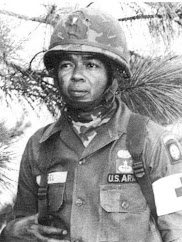Welcome back viewers
This week's hero is...
Tukaram Omble
November 26, 2008, was a day that began like any other for the citizens of Mumbai. But at 8 PM, gunfire and numerous explosions erupted across the city. Ten heavily armed militants of the terrorist organization Lashkar-e-Taiba, had snuck into the city from the docks on a hijacked trawler. Each of them were armed with fully automatic AK-47s, six to seven magazines (containing 50 rounds), 400 rounds of ammunition, and eight hand grenades. Within minutes, hundreds of people lay dead or dying in Mumbai's streets.
Mumbai's police officers attempted to stop the attackers but found themselves severely outgunned. Throughout the night, they did their best to save as many people as they could. Things took a turn for the worse when the gunmen turned their attention to Mumbai's famous hotel, the Taj Mahal Palace and began to massacre the hundreds of tourists and employees inside. In desperation, the Indian special forces were called in. Despite their best efforts, it took a full seven hours to eliminate all the terrorists and rescue all the civilians.
While most of the special forces were focused on saving those in the Taj Mahal Palace, two of the terrorists launched an attack at the city's CST train station. They fired and threw grenades into the tightly packed crowd of pedestrians. Only four policemen were there at the time, and three of them were killed and the fourth severely wounded within seconds of each other. After killing 58 people and wounded 104 in the terminal, the terrorists then carjacked a taxi and tried to drive to a nearby hospital and massacre the patients.
However, a small group of policemen led by Constable Tukaram Omble spotted the terrorists and quickly blocked the road. They then opened fire on the vehicle with everything they had. Constable Omble then approached the car to try an apprehend the gunmen. One of them opened the passenger side door and put his hands up as if to surrender (the other was dead).
As Constable Omble approached, the surviving terrorist brandished his AK-47 and aimed it directly at the crowd behind him. Omble reacted almost immediately, he stepped in front of the gun's barrel and grabbed the terrorist by the throat. The terrorist pulled the trigger and fired point blank into Constable Omble's torso. But the latter refused to let go and successfully pulled the terrorist from the car. Other policemen grabbed the gun and finally took the terrorist into custody. Unfortunately, Constable Tukaram Omble had been shot at least 40 times by the burst of the AK-47. Almost immediately after pulling the terrorist from the vehicle, he collapsed and died on the street.
It ultimately took three days for all ten of the terrorists to be killed or apprehended. By then, the attacks of 26/11 (as it would come to be known) had claimed 174 lives (including 29 foreigners) and wounded more than 300. Among the dead were 15 police officers (Omble included) and two commandos. Nine of the terrorists were killed and one (the one apprehended by Omble) was captured. The surviving terrorist was identified as, Mohammed Ajmal Amir Kasab. In 2010, Kasab was convicted on more than 80 counts of murder and sentenced to death. He was executed on November 21, 2012.
For his incredible courage and sacrifice, Tukaram Omble was posthumously awarded the Ashoka Chakra Medal. It is India's highest peacetime decoration for valor. Today he is remembered as one of India's bravest and most noble policemen. It is an honor that could not be more fitting for such a selfless and humble man who gave his life to save others. He should not just be remembered as a hero of India, but of the world.
https://swarajyamag.com/blogs/it-wouldve-been-sameer-chaudhary-not-ajmal-kasab-heres-how-brave-tukaram-omble-foiled-plans-to-blame-2611-on-hindus
https://www.indiatimes.com/trending/social-relevance/tukaram-omble-26-11-mumbai-terrorist-attack-501153.html
https://www.thebetterindia.com/204021/mumbai-attacks-26-11-hero-tukaram-omble-ashok-chakra-daughter-remembers/
https://www.indiatimes.com/trending/social-relevance/tukaram-omble-26-11-mumbai-terrorist-attack-501153.html

